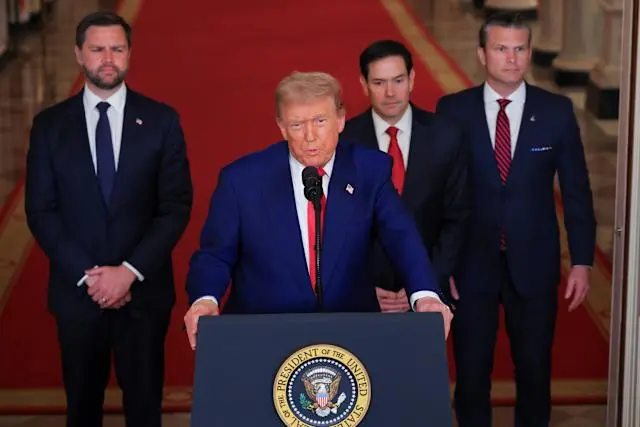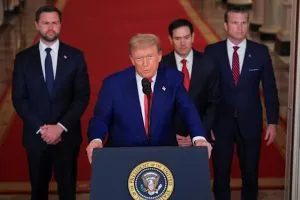U.S. Strikes Three Iranian Nuclear Sites, Escalating Israel-Iran Conflict

June 22, 2025 – Washington, D.C.
In a dramatic escalation of the ongoing conflict between Israel and Iran, the United States has inserted itself directly into the fray by launching airstrikes on three of Iran’s key nuclear facilities—Fordow, Natanz, and Isfahan. The operation, conducted in close coordination with Israel, marks a significant shift from Washington’s previous role of providing defensive support, such as intercepting Iranian missiles, to taking offensive military action. The strikes, ordered by President Donald Trump, have ignited a firestorm of international reactions, with Iran vowing a “severe” response and warning of potential retaliation against U.S. and Israeli targets.
Background: A Decades-Long Standoff
The Israel-Iran rivalry has long been defined by mutual hostility, with Iran’s nuclear program serving as a flashpoint. Israel, viewing a nuclear-armed Iran as an existential threat, has conducted covert operations, including alleged cyberattacks and assassinations, to disrupt Tehran’s nuclear ambitions. Iran, meanwhile, insists its nuclear program is for peaceful purposes, though international inspectors have raised concerns about undeclared sites and enrichment activities beyond civilian needs.
The United States, a steadfast ally of Israel, has historically pursued a mix of diplomacy, economic sanctions, and military posturing to curb Iran’s nuclear capabilities. The 2015 Joint Comprehensive Plan of Action (JCPOA), or Iran nuclear deal, briefly constrained Iran’s program but collapsed in 2018 when the U.S. withdrew under Trump’s first administration. Since then, Iran has accelerated its uranium enrichment, prompting renewed tensions.
Recent months have seen heightened hostilities, including Israeli airstrikes on Iranian proxies in Syria and Lebanon, and Iran’s retaliatory missile attacks on Israel. The U.S. strikes on June 20, 2025, targeting Fordow’s underground enrichment facility, Natanz’s centrifuge complex, and Isfahan’s nuclear research center, represent a bold new phase in this conflict.
Details of the Strikes
According to U.S. and Israeli officials, the operation was meticulously planned to maximize damage to Iran’s nuclear infrastructure while minimizing civilian casualties. Fordow, a heavily fortified site built into a mountain, has been a particular concern due to its role in enriching uranium to near-weapons-grade levels. Natanz, Iran’s primary enrichment facility, has been targeted in past sabotage efforts, while Isfahan hosts research critical to Iran’s nuclear program.
The Pentagon confirmed the use of precision-guided munitions, including bunker-busting bombs, to penetrate fortified sites like Fordow. Satellite imagery circulating on X shows significant damage to surface structures at Natanz and Isfahan, though the extent of destruction to underground facilities remains unclear. U.S. officials claim the strikes set back Iran’s nuclear program by “years,” but independent analysts caution that Iran’s dispersed and resilient infrastructure may recover sooner.
Strategic Objectives and Risks
The U.S. and Israel’s primary goal appears to be delaying or derailing Iran’s path to a nuclear weapon. Israeli Prime Minister Benjamin Netanyahu, in a televised address, described the strikes as “a historic blow to the Iranian regime’s nuclear threat.” President Trump echoed this sentiment, stating on X: “We took decisive action to protect America and our allies. Iran will never have a nuclear bomb on my watch.”
However, the strikes carry substantial risks. From a strategic perspective, past attacks on Iran’s nuclear program—such as the Stuxnet cyberattack in 2010 or the 2020 assassination of scientist Mohsen Fakhrizadeh—have delayed but not halted Tehran’s progress. Iran’s ability to rebuild, coupled with its growing expertise in centrifuge technology, suggests the strikes may be a temporary setback.
Moreover, the operation risks triggering a broader regional war. Iran’s Supreme Leader, Ayatollah Ali Khamenei, condemned the strikes as “an outrageous violation of sovereignty” and promised a “severe and proportionate response.” Iranian officials have hinted at potential counterstrikes on U.S. bases in Iraq or the Gulf, Israeli cities, or critical infrastructure like oil facilities in Saudi Arabia. Hezbollah, Iran’s powerful proxy in Lebanon, has already fired rockets into northern Israel, signaling a possible multi-front escalation.
International and Domestic Reactions
The strikes have drawn sharp divisions globally and within the U.S. Russia and China, key backers of Iran, issued strong condemnations, with Beijing calling the attacks “a reckless act that undermines global stability.” European allies, including France and Germany, expressed cautious support for curbing Iran’s nuclear program but urged restraint to avoid a wider conflict. The UN Security Council is set to hold an emergency meeting to address the crisis.
In the U.S., reactions are polarized. Republican lawmakers, such as Senator Ted Cruz, praised the strikes as “long overdue,” arguing they demonstrate American resolve. However, Democratic leaders, including Senate Minority Leader Chuck Schumer, criticized the lack of congressional authorization, calling the operation “a dangerous escalation without a clear strategy.” Posts on X reflect similar divides, with some users hailing the strikes as a “masterstroke” and others warning of “guaranteed Iranian retaliation” that could cost American lives.
Critics also point to the timing of the strikes, which followed reports of U.S.-backed peace talks between Israel and Iran. Some analysts, citing X posts, speculate that the talks were a pretext to lure Iran into lowering its defenses, raising ethical questions about the operation’s planning.
Legal and Diplomatic Implications
Under international law, the strikes’ legality is contentious. Article 2(4) of the UN Charter prohibits the use of force against a state’s sovereignty absent self-defense or Security Council approval. The U.S. and Israel claim the strikes were preemptive, citing Iran’s alleged progress toward a nuclear weapon as an imminent threat. However, without public evidence of an immediate danger, legal scholars argue the attacks violate international norms.
Diplomatically, the strikes may derail efforts to revive the JCPOA. Iran, which had signaled openness to negotiations, announced it would suspend all talks and accelerate its nuclear activities in response. The move could also strain U.S. relations with European allies, who have prioritized diplomacy, and embolden hardliners in Tehran, reducing the prospects for de-escalation.
Economic and Regional Fallout
The strikes have already disrupted global markets, with Brent crude oil prices surging 8% to $95 per barrel amid fears of Iranian retaliation targeting Gulf oil infrastructure. Energy analysts warn that a prolonged conflict could push prices above $120, exacerbating inflation in the U.S. and Europe.
In the region, the strikes have intensified tensions. Saudi Arabia and the UAE, wary of Iranian reprisals, have bolstered their defenses with U.S. support. Meanwhile, ongoing aerial combat between Israel and Iran, now in its second week, shows no signs of abating, with both sides exchanging missile and drone strikes.
Skepticism and Alternative Narratives
Some voices on X and independent analysts question the official narrative. Claims that the strikes were necessary to stop an imminent Iranian nuclear threat are met with skepticism, given the lack of declassified intelligence. Others suggest the operation was driven by domestic political motives, such as bolstering Trump’s image ahead of midterm elections, or by Israeli pressure to lock the U.S. into a harder line against Iran. The absence of congressional oversight fuels speculation about executive overreach.
Looking Ahead
The U.S. strikes on Iran’s nuclear sites have thrust the Middle East into a precarious new phase. Iran’s promised retaliation, which could range from cyberattacks to direct military action, will likely dictate the conflict’s trajectory. The Biden administration’s







